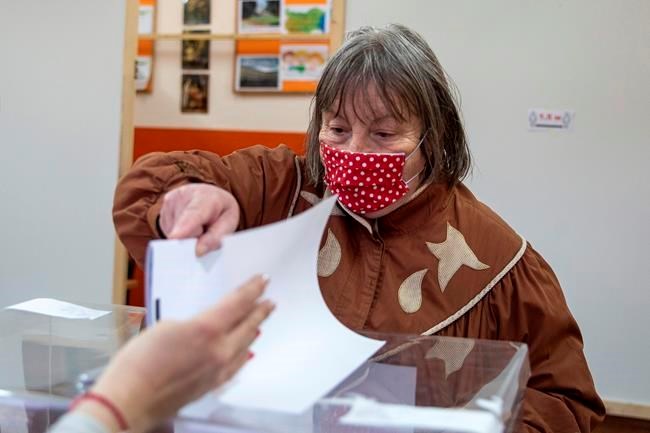The
The election was widely seen as a referendum on Prime Minister Boyko Borissov after months of anti-government protests and amid a surge in coronavirus infections. Late Sunday, Borissov called on his opponents to form a broad-based governing coalition.
Four exit polls had the GERB party finishing on top, with around 25% of the vote. The polls placed the opposition Socialist Party second with some 17%, slightly ahead of the new "There is such a nation" party led by prominent TV entertainer Slavi Trifonov.
The Central Election Commission said voter turnout Sunday was nearly 40% by 5 p.m., a smaller showing than in previous elections. Some 6.7 million people had been eligible to cast ballots for 240 lawmakers.
In a statement on Facebook, Borissov called on his opponents to join forces in a demonstration of political stability in Bulgaria, hinting at the idea of forming a government of experts supported by a broad parliamentary majority.
“I offer you peace, let us appoint the experts and until December we can overcome the pandemic and move forward. That is my offer to all of you. Let us choose the best people to do the job. United we are strong,” he said.
Borissov, 61, who has led the populist GERB party since its founding in 2006, has governed Bulgaria with an iron grip for most of the last 11 years.
“I have always taken into account what the people decide ... Let the elections be honest,” Borissov was quoted as saying after he cast his ballot without reporters present due to pandemic restrictions.
It could be days before the final official results are announced. If they confirm the exit polls, Borisov will be handed a mandate to form his fourth Cabinet.
It looks, however, that it will be an uphill task for him to find allies to form a stable governing coalition in a fragmented parliament where most groups have already rejected any
Political analysts predicted weeks of talks to form a viable coalition and did not exclude the possibility of another election.
President Rumen Radev, a vocal critic of Borissov, urged Bulgarians to turn Sunday's election into the first step toward a return to laws and rules.
“I voted against the collapse of statehood, lawlessness and corruption and for a free, just and prosperous Bulgaria,” he said Sunday after voting.
Bulgaria, which joined NATO in 2004 and the European Union in 2007, has been repeatedly criticized for not tackling corruption and for deficiencies in the rule of law and media freedom.
Still, Borissov on Sunday trumpeted the country's ties with the West.
“The immense support we received from our counterparts in Europe shows the importance of a stable European government in Bulgaria,” he said.
Veselin Toshkov, The Associated Press

